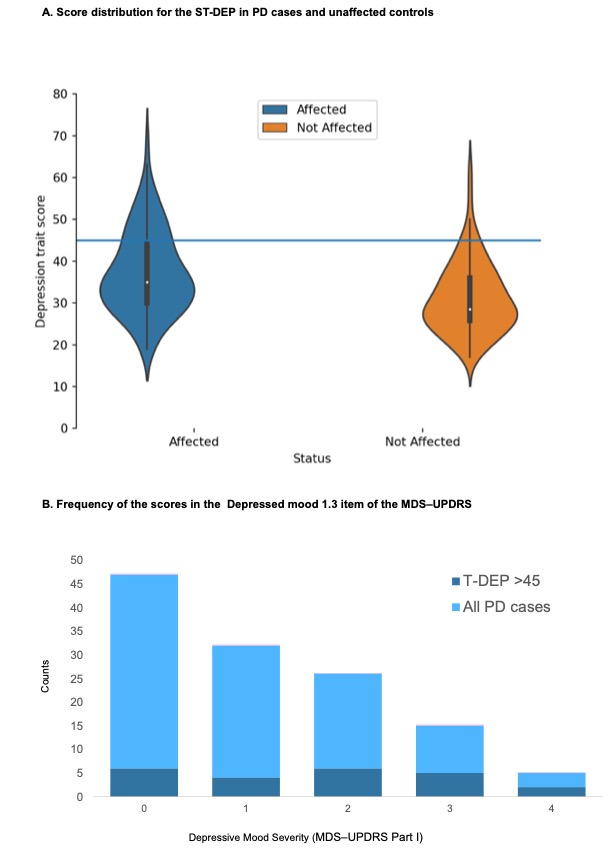Objective:
The present study aimed to provide a better understanding of depression manifestations in Mexican PD patients within the Mexican Parkinson’s Disease Research Network (MexPD), a case-control cohort study established in 2021.
Background: Depression is one of the most common non-motor symptoms among patients with Parkinson’s Disease (PD), which often appears in the prodromal stage and negatively impacts quality of life of patients, worsening the motor and cognitive performance of individuals. However, the characterization of depression in PD patients, particularly in underrepresented populations such as Mexico, remains limited.
Method: A total of 125 PD patients and 88 controls were recruited from public and private health centers in Mexico (Table 1). We collected basic clinical data and depressive symptoms were assessed using the State-Trait Depression Inventory (ST-DEP) and the Depressed mood 1.3 item of the MDS–UPDRS part I. We set a cutoff value of 45 points in the trait subscale of ST-DEP inventory (T-DEP) for clinically relevant depression.
Results:
Our study showed that according to T-DEP 24% of PD patients had clinically relevant levels of depression (T-DEP ≧ 45), compared to 6% of controls (Chi-squared= 9.6662, p = 0.00094). Wilcoxon rank sum tests revealed that patients are more likely to have higher depression scores than controls in both trait and state subscales of the ST-DEP (p = 0.000019) (Figure 1.A).
Significant cross-assessment correlation between the T-DEP and Depressed mood 1.3 item of the MDS–UPDRS part I was found in this study (R=0.56, p=0.005).
Interestingly, 26% of the patients identified as presenting clinically relevant depression (T-DEP ≧ 45) had a 0 score in the Depressed mood 1.3 item of the MDS–UPDRS (Figure 1.B), which corresponds to the lowest score in the 5-point severity scale. This outcome, though counterintuitive, highlights the need for deeper screening for depression assessment in PD.
Conclusion: Our findings provide evidence for high prevalence and severity of depressive symptoms in Mexican PD patients and highlight the need for further screening of PD-specific depression symptomatology to accurately diagnose and treat PD depressive disorders. The MexPD cohort represents a valuable resource for continued research on the neuropsychiatric aspects of PD in underrepresented populations.
To cite this abstract in AMA style:
P. Reyes-Pérez, A. Medina-Rivera, A. Ruiz-Contreras, S. Alcauter-Solorzano, M. Rentería, A. Lazaro-Figueroa, Y. Matuk-Pérez, N. Gandarilla-Martínez, K. Salinas-Barboza, I. Estrada-Bellmann. Depression profile in Mexican patients with Parkinson Disease: a cross-sectional study [abstract]. Mov Disord. 2023; 38 (suppl 1). https://www.mdsabstracts.org/abstract/depression-profile-in-mexican-patients-with-parkinson-disease-a-cross-sectional-study/. Accessed April 20, 2025.« Back to 2023 International Congress
MDS Abstracts - https://www.mdsabstracts.org/abstract/depression-profile-in-mexican-patients-with-parkinson-disease-a-cross-sectional-study/


